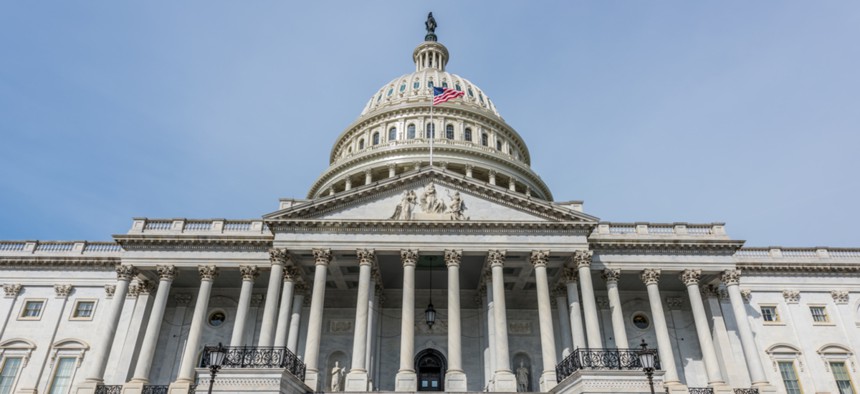Lawmakers Bash the President’s Federal Pay Freeze Plan

MH Anderson Photography/Shutterstock.com
Plus a familiar face gets confirmed as the Energy Department’s first assistant secretary for cybersecurity.
Lawmakers last week condemned the White House’s decision to scrap pay raises for government employees next year, calling the move an “assault on our federal workers.”
“President Trump is feeling cornered and lashing out by cancelling a modest, planned pay increase for our dedicated federal workforce,” Rep. Gerry Connolly, D-Va., said in a statement. “His tax bill exploded the deficit, and now he is trying to balance the budget on the backs of federal workers.”
Trump on Thursday announced his intention to freeze pay for the government’s civilian employees in fiscal 2019, citing the need for performance-based pay and the high cost of employee salaries. If Trump hadn’t acted, workers would’ve received an automatic 2.1 percent across-the-board raise and a 25 percent increase in locality pay under the 1990 Federal Employees Pay Comparability Act.
“I can think of nothing more hypocritical or disingenuous than to turn around and throw hardworking federal employees under the bus on the pretext of fiscal responsibility,” Sen. Mark Warner, D-Va., said in a statement.
In early August, the Senate approved a minibus spending bill that would grant government workers a 1.9 percent pay raise, but the House didn’t include any compensation changes in its version of the legislation. As a conference committee meets this week to reconcile the differences between the respective spending packages, the president’s decision could throw a wrench into an already contentious budget battle.
No Trips to Disneyland for You, Comrade
Foreign hackers who attack the U.S. would face immediate penalties under a bill introduced last week by Sens. Cory Gardner, D-Colo., and Chris Coons, D-Del.
The bill would automatically revoke existing visas and prohibit new visas for anyone the government designates as a “critical cyber threat actor.”
It would also require the president to impose one or more financial or trade sanctions against a person or organization that’s deemed a cyber threat actor and publish that person or organization’s name in the Federal Register.
The bill lists a slate of possible sanctions, including limiting U.S. aid or prohibiting investments that would benefit the person or organization but leaves it up to the president which ones to impose.
The Senate bill is a companion to similar legislation introduced by Rep. Ted Yoho, R-Fla., in the House in June. The House bill has 13 cosponsors so far, including House Foreign Affairs Chairman Ed Royce, R-Calif., and ranking member Eliot Engel, D-N.Y.
Still Waiting on Election Security
Tuesday marks 12 days since the Senate Rules Committee abruptly delayed consideration of the Secure Elections Act.
The bill is Congress’ last best hope to pass election security legislation before the November midterms. The chances of that happening, however, are getting slimmer with each legislative day.
Bill sponsor Sen. James Lankford, R-Okla., told the Washington Post Friday that the bill was down but not out. “This is an important bill that I will not let fail. I look forward to working with members and groups that have technical concerns with the text ... as we continue to walk through its passage,” Lankford said.
A Familiar Face at Energy
The Senate confirmed Karen Evans as the Energy Department’s first assistant secretary for cybersecurity Aug. 28. The office Evans will lead is new, first announced by Energy Secretary Rick Perry on Valentine’s Day this year.
Evans, however, is no stranger to federal technology and cybersecurity, having served for decades in government, including as de facto federal chief information officer during the George W. Bush administration.
Perry tweeted Aug. 30 that he is “excited to have Karen’s expertise as we take a proactive approach to addressing the cyber threats facing our energy infrastructure.”
The Kid Stays in the Picture
Rep. Eric Swalwell, D-Calif., participated in an upcoming documentary about Russian meddling in the 2016 election titled, “Active Measures,” according to a Friday press release.
Swalwell, who serves on the House Intelligence Committee, was interviewed about that committee’s contentious investigation into the Russian hacking and influence campaign, his office said.
“I’m happy to have helped in the creation of this important film detailing the urgent need for us to protect our democracy,” Swalwell said in a statement.
A SCOTUS Nominee and Three Tech Execs Walk Into a Hearing Room
The House is back in session this week, but the fireworks will be on the Senate side where a Supreme Court nominee and a trio, at least, of top Silicon Valley execs are slated to testify. Here’s a rundown.
At 9:30 a.m. Tuesday, Trump’s Supreme Court nominee Brett Kavanaugh will testify before the Senate Judiciary Committee.
At 9:30 a.m. Wednesday, the Senate Intelligence Committee will hold a rare open hearing on foreign influence operations on social media. Facebook Chief Operating Officer Sheryl Sandberg and Twitter CEO Jack Dorsey are expected to testify along with a representative from Google.
At 10 a.m., the Senate Commerce Committee will hold a rescheduled meeting to consider Kelvin Droegemeier’s nomination to be director of the White House’s Office of Science and Technology Policy among other business. Committee members will also mark up the Supporting Veterans in STEM Careers Act.
At 1:30 p.m. that day, Dorsey will head across the Hill to appear before the House Commerce Committee.
At 10 a.m. Thursday, the House Homeland Security Committee's cyber and transportation panels will consider cyber threats to the U.S. aviation sector.
At 9:15 a.m. Friday, the House Financial Service Committee will ponder terrorist financing schemes.
NEXT STORY: Quick hits: Aug. 31





